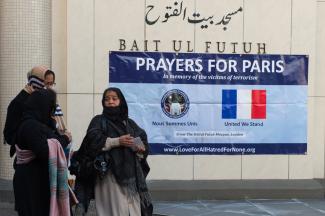Terrorism
To fight ISIS, embrace Islam

ISIS is a terror outfit that uses the black-and-white narrative of suppressed Muslims being forced to fight the rest of the world in self defence. They don’t mind Islam being discredited. On the contrary, they want non-Muslims to turn against members of this faith.
Anything that can be read as western disrespect for Islam feeds the anger ISIS wants to instil in Muslims. At the same time, the terrorists want all Muslims who do not accept their brutal world view to suffer. European hostility towards refugees from Afghanistan, Libya or Syria thus serves their cause in the double sense of hurting Muslims who, in the ISIS perspective, deserve punishment. If, on the other hand, the EU acts in a more welcoming way, the ISIS narrative collapses.
Europe’s radical right from the Front National in France to the Lega Nord in Italy and the Alternative für Deutschland in Germany endorse xenophobia. In a symbiotic way, they benefit from terror attacks. Their xenophobic reaction, in turn, fans ISIS flames. Intolerance breeds intolerance. Government leaders should be careful not to feed this vicious cycle. Any talk of a clash of civilisations is wrong, and even the rhetoric of war is overblown. It gives legitimacy to killers who are criminals, not soldiers.
Jihadi criminals have indeed killed scores of people in Paris, Ankara, Beirut and Bamako in recent weeks. Only the first of these cities is a western capital, the other cities are predominantly Muslim. Jihadism is no where close to destroying western civilisation, its main impact is to terrorise Muslims. A handful of suicidal extremists can cause terrible suffering in Paris, but the French capital is not, was not and will not be at risk of falling into their hands.
ISIS and similar terrorist groups pretend to be the true representatives of Islam, but they are not. Islam was never a monolithic ideology. In the Sunni tradition, the Koran is sacrosanct, but its interpretation is up to debate, and such debate gave rise to a long history of sophisticated scholarship that was cultivated by many different schools in many different cities. Jihadis neither appreciate the wealth of this tradition, nor do they appreciate the diversity of Islam which has spawned many traditions of belief. In Timbuktu, they even did their best to destroy ancient manuscripts because this kind of Muslim heritage does not agree with their totalitarian ideas.
The Arab region is in turmoil. ISIS is one of many militias and military forces. It is trying to establish a full-blown state, but is not recognised as a legitimate force by any Muslim government. It wants to expand its power, but it is not promoting the faith. Generally speaking, Islamist militants are not faith leaders. They are violent criminals.
Their black-and-white narrative does not resonate with the vast majority of Muslims. In Europe, however, it dangerously resonates with a minority of youngsters who feel marginalised and alienated. Many of them, but not all, are from migrant families. Typically, the parents are better integrated into mainstream society and not religious in a fundamentalist sense. The phenomenon is especially pronounced in France and Belgium, but it is evident in other countries too, including Germany.
EU leaders should ponder the fact that the terrorists in Paris were, as far as we know, mostly citizens of member states. They should note, moreover, that many jihadis in Europe become extremists in prison cells rather than in Mosques. European societies have failed in terms of inclusiveness. Some may argue that social work and religious education are too expensive in view of tight public budgets. The price Paris has now paid for neglect, however, is far higher.
In Syria and Iraq, ISIS has managed to conquer substantial territory. It is necessary to tackle the militia by military means there. That cannot be done by air strikes alone. Western governments are correct to argue that the ground troops will have to be Muslim so as not to feed the Islamist narrative of crusaders hunting down Muslims. They have a point. Accordingly, they should do their best to undermine the ISIS narrative in Europe as well. To fight ISIS effectively, Europe must embrace Islam.
Hans Dembowski







